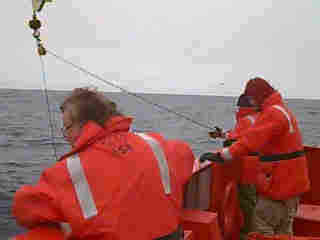
|
|
3 February, 1998
Gould-en Greetings!
The last two days the skies have been overcast and cloudy. Visibility is
relatively low and this morning we've had a light rain. From all the past
indications this is typical Antarctic weather and sky conditions. In the
safety training tapes for Antarctica, one of the beginning phrases is,
"Antarctica is a cold and harsh continent." It becomes the operative
phrase on board as things stop working, there are glitches in the systems,
and data is lost. So what motivates people to come to Antarctica again and
again. As I have talked people on board, I have not found them all to be
scientists by training who must come here to get the needed data. The
common denominator that I have found is a love of adventure and the
willingness to meet challenges.
A group from University of California Santa Barbara headed by PI Ray Smith
is here to study bioptics. Basically this is the penetration of light in
the upper 30 meters of water and how it relates to the productivity of the
ocean. Charleen Johnson has been in charge of operations for this project
on board ship, yet she has a degree in Business. She started out as an
administrator in a university research lab. She would also work with
technical reports and then with the computer as that technology came on
line. As time went on, she evolved more toward being a resource to get
information from computers and was hired by Ray Smith to not only work with
the data computer end of the project but to be a pusher and organizer.
Charleen's advice to everyone is to try everything you can. Learning how
to work and be flexible in difficult situations can come from outside
activities such as hiking and camping. Having general skills can be more
valuable in the long run than having specific knowledge. It is hard to
know what job you want or will end up with after job training Having a
variety of experiences in one's background gives more options for careers.
Today I ran many, many dissolved oxygen samples from different locations
and different depths of the Antarctic waters. It seems very repetitive,
but all the samples represent different parts of the whole picture.
Warm regards,
Mrs. D

Contact the TEA in the field at
.
If you cannot connect through your browser, copy the
TEA's e-mail address in the "To:" line of
your favorite e-mail package.
|
